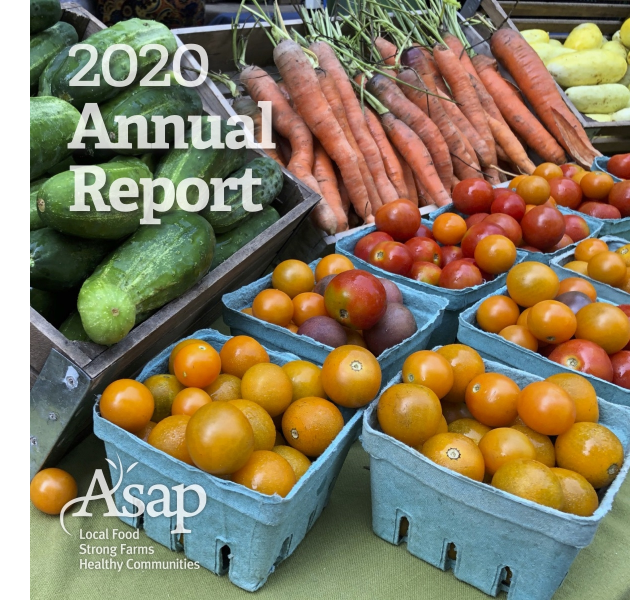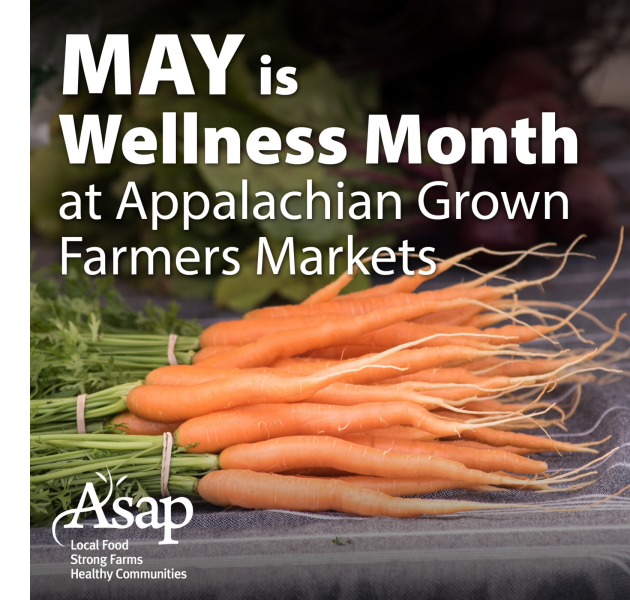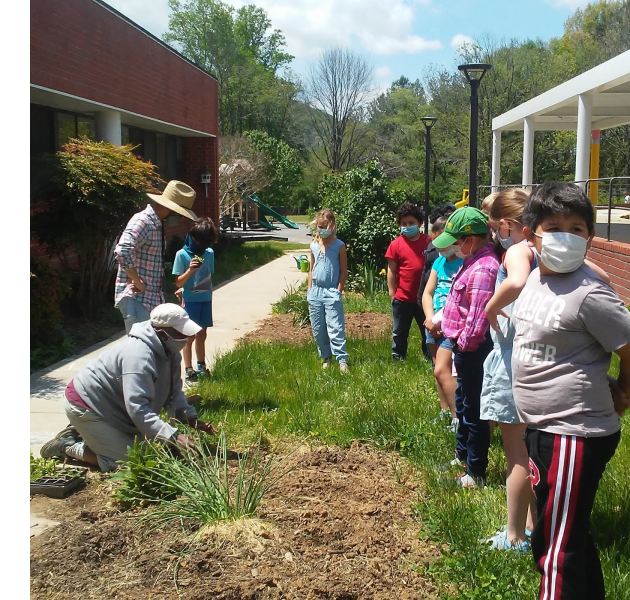|
|
|
monthly news from ASAP | MAY 2021 | asapconnections.org
|
| |
|
|
A New Look for the Growing Minds Website
|
We're excited to reveal our updated Growing Minds website at growing-minds.org! In addition to sporting a clean, modern look, the redesigned site features new top menu navigation to improve the user experience and make it easier to access farm to school resources. Visitors can now learn about Growing Minds programs and services under "Our Work," explore the benefits of school gardens, local food in schools, and beyond under "Farm to School," and easily access lesson plans, videos, farm to school funding, lending library, recipes, publications, and more from the "Resources" menu. Also new:
|
|
 |
Read ASAP's 2020 Annual Report
|
 We're already well into 2021, and reflecting on 2020 has made us feel gratitude for all of YOU who stepped up to support farmers, farmers markets, and your neighbors in need of food assistance. ASAP's 2020 Annual Report report is evidence that even during a challenging year for us all, we are resilient when we stick together and remain mission-focused. A few highlights: We're already well into 2021, and reflecting on 2020 has made us feel gratitude for all of YOU who stepped up to support farmers, farmers markets, and your neighbors in need of food assistance. ASAP's 2020 Annual Report report is evidence that even during a challenging year for us all, we are resilient when we stick together and remain mission-focused. A few highlights:
- Despite so many unknowns, 90 percent of farmers markets reopened last year. Thank you for buying local!
- Educators found ways to garden with their classes, even while school was virtual. A student at Weaverville Primary told his teacher, "I think I am going to try broccoli for the first time." Feel joy as you read about Weaverville Primary's virtual gardening experience.
- SNAP usage at farmers markets tripled in 2020. Henry, a Double SNAP user told us, "I really appreciate that this program exists. It is truly the reason I am able to attend the markets at all and I cannot express my gratitude for that enough!"
Like Henry, we will keep expressing our gratitude to you! With your support we can provide teachers what they need to garden with their students, we can double more SNAP dollars, and we can help farmers markets navigate the changing landscape of pandemic restrictions. Read the full report to learn about all the ways your investment in ASAP creates impact. Thank you for your continued support in 2021!
|
|
 |
May Is Wellness Month at Farmers Markets
|
 As part of our Farm Fresh for Health initiative As part of our Farm Fresh for Health initiative
we're promoting May as Wellness Month at area farmers markets. Seven farmers markets, in Buncombe, Haywood, Henderson, and Madison counties, will host health and wellness vendors and offer free activities and resources in events scheduled throughout the month. Click the links below to find details about events at specific markets.
- ASAP Farmers Market, May 22, 9 a.m. to noon
- Enka-Candler Tailgate Market, May 27, 3 to 6 p.m.
- Haywood’s Historic Farmers Market, May 22, 9 a.m. to noon
- Hendersonville Farmers Market, May 22, 8 a.m. to 1 p.m.
- Mars Hill Farmers and Artisans Market, May 22, 10 a.m. to 1 p.m.
- Mills River Farmers Market, May 8, 15, 22, 29, 8 a.m. to noon
- Weaverville Farmers Market, May 19, 2 to 5 p.m.
|
|
 |
Looking Back on Growing Local Radio
|
 For the past five years, over 268 episodes, writer and audio producer Jen Nathan Orris has told the stories of farmers, local food advocates, educators, and more for ASAP's Growing Local Radio. The series finished its run last month with an episode about Tierra Fertil Coop, a group of Hispanic farmers in Henderson County with a collective vision for fostering social equity through local food. For the past five years, over 268 episodes, writer and audio producer Jen Nathan Orris has told the stories of farmers, local food advocates, educators, and more for ASAP's Growing Local Radio. The series finished its run last month with an episode about Tierra Fertil Coop, a group of Hispanic farmers in Henderson County with a collective vision for fostering social equity through local food.
We asked Jen to name a few of her favorite episodes over the years, which include Long Family Farm, Looking Glass Creamery (original and follow up), a series on the legacy of tobacco farming (parts one and two), and first day of market stories.
As for some of her most memorable recording experiences, she says, "I visited the rice fields at Lee's One Fortune Farm the morning after a huge rain storm. They were gracious enough to trudge through calf-high water with me so I could record the sound of wind rustling the rice plants. My feet got stuck in the mud and I felt myself falling, so I lifted my recorder and microphone over my head as I fell shoulder-first into the water. I was a mess, but the audio was saved!" (Listen to parts one and two of that series.)
Growing Local Radio may have come to an end, but the stories continue to live on our website, both in audio and written formats. We encourage you to go back and explore the archive.
|
|
 |
Call for Farms to Participate in "Meet Your Farmer" Videos
|
 Are you (or is your farm) ready for your closeup? We're looking for farms for the next round of our Meet Your Farmer video series! Meet Your Farmer videos feature interviews and virtual tours from farmers (and sometimes junior farmers!) in Western North Carolina. These 3-5 minute videos are targeted to young students and families and aim to introduce kids to the people in our community who grow and raise food, fiber, and flowers. Are you (or is your farm) ready for your closeup? We're looking for farms for the next round of our Meet Your Farmer video series! Meet Your Farmer videos feature interviews and virtual tours from farmers (and sometimes junior farmers!) in Western North Carolina. These 3-5 minute videos are targeted to young students and families and aim to introduce kids to the people in our community who grow and raise food, fiber, and flowers.
Interested? Let us know by filling out this form. Participating farms receive a $100 stipend plus a copy of the final video to use for their own promotional purposes. Note that the Meet Your Farmer program is currently only open to Appalachian Grown farms located in WNC.
|
|
 |
ASAP is currently hiring for two full-time positions. Find job descriptions and application instructions on our website. Both postings will remain open until filled. Applications accepted only by email. Please do not call or come by the office.
The Local Food Campaign Program Coordinator will assist in the development and implementation of farm and partner outreach and engagement programming as part of the Local Food Campaign team.
The Events Coordinator, Local Food Campaign, provides coordination and management for ASAP’s program and fundraising events, including the Business of Farming Conference, Farm Tour, workshops, etc. This position also coordinates and manages volunteers and interns.
|
|
 |
 FACES OF LOCAL FACES OF LOCAL |
| |  ASAP likes to share the stories of people who help us fulfill our mission. This month we talk with Karen Chapman, the garden coordinator at W.D. Williams Elementary School in Swannanoa, N.C. ASAP likes to share the stories of people who help us fulfill our mission. This month we talk with Karen Chapman, the garden coordinator at W.D. Williams Elementary School in Swannanoa, N.C.
Tell us about your garden.
I was inspired to do a school garden when I attended the Environmental Educators of North Carolina conference right before COVID happened. The presenter was a AP Biology teacher at the Enka High School. She was able to create a beautiful vegetable and pollinator garden that the students were involved in maintaining. The presentation got my brain thoughts turning as to how I could have a vegetable and pollinator garden at W.D. Williams.
I got permission from our school principal. First grade teacher Sarah Torry and I sat together and wrote a grant for the Master Gardeners program, which we were awarded in spring of 2020. I planted black-eyed susans, echinacea, red okra, fox glove, milkweed, beans, peas, and spinach. Then, COVID disrupted all of my activities planned for students to participate in the garden. I had no student participation during the spring, summer, or fall of 2020.
Then in spring of 2021, when all the students were [back in person], I was able to get several grade levels planting seeds as starters in their classrooms. With the help of ASAP’s Growing Minds, which gave us free seeds, each class was able to plant radishes, spinach, beans, peas, flower mixes, lettuce, and squash.
What are some things you learned during the process?
Some things that I have learned is to make sure the beds have new soil, nitrogen, fertilizer, and compost mixed in with old soil in order to cultivate plant growth. Another thing I have learned is to plant seeds as starts instead of just putting seeds in the ground, because sometimes the seeds don't germinate, so it leaves an empty space in the beds. Third thing I learned, it is good to network with schools and community organizations such as Environmental Educators of NC, Master Gardeners, and ASAP to get the help I need! And the last thing: I appreciate the rain that falls. I like to watch the plants perk up and grow!
What are some of your gardening successes and challenges?
Some of my gardening successes have been that I had red okra plants grow very tall! I have been able to manage five beds with different flowers, pollinator plants, and vegetables. I was able to successfully get rid of invasive mint plants in one of the beds by pouring horticultural vinegar in the soil and covering it with plastic for a year. Trying to keep the weeds down is always a challenge!
How have you seen the gardening experience help kids learn and experience new things?
Gardening is fun, hands-on learning. The students painted rocks to decorate the garden beds. They like to water the garden beds. I show students how to dig small, medium and large holes in the soil to plant their seeds. I have observed that students like to kill bugs and worms, but I have learned to teach them that whenever there are a lot of bugs and worms in the soil, that means the soil is good!
What will happen in the garden over the summer?
Our last day of school is June 1, so I will be maintaining the garden beds from June to August. Students will be able to see garden growth during the summer, but unfortunately they will not have access to it, because there will only be limited staff in the building during the summer. I am hoping in the fall of 2021 I will have vegetables ready for the students to taste.
|
|
|
|
 RECIPE OF THE MONTH RECIPE OF THE MONTH |
| |  The new Growing Minds website includes new local food recipes that work for both kids and adults. This spinach strawberry salad highlights two ingredients at the height of their season right now in addition to a sweet and tangy dressing to tie it together. The new Growing Minds website includes new local food recipes that work for both kids and adults. This spinach strawberry salad highlights two ingredients at the height of their season right now in addition to a sweet and tangy dressing to tie it together.
Serves 4-6
Ingredients:
- 2 Tbsp. honey
- 1/3 cup olive oil
- Dash cinnamon
- 3 Tbsp. lemon juice
- 1 tsp. Dijon mustard
- 1/8 tsp. salt
- 2 cups local strawberries, sliced
- 8 oz. baby spinach leaves
Directions:
- Combine the first 6 ingredients in a jar and shake until the honey is dissolved.
- Wash and dry the greens, then put them in a salad bowl.
- Add the strawberries and toss gently.
- Pour on the salad dressing and toss the salad once more.
|
|
|
|
PHOTOGRAPHER SPOTLIGHT |
|
May's photo of the month, of colorful swiss chard, comes from Meghan Bosley of Mountain Food Products. Participating in a CSA program or shopping at farmers markets makes it easy to discover new veggies or greens. Not sure how to cook something? Ask your farmer! Farmers are a great source for recipes or cooking tips. Many send an e-newsletter, post recipes on social media, or offer menu ideas for their CSA members. Connect with farmers at appalachiangrown.org.
|
|
|
|
 MEDIA HIGHLIGHTS MEDIA HIGHLIGHTS |
| "In a recent survey of markets and shoppers, ASAP found the [Double SNAP] program has brought a dramatic increase of SNAP-using customers to farmers markets. That's also meant an influx of needed income for local farmers and food businesses."
—Citizen Times reported on the expansion of Pandemic EBT, which works like SNAP, meaning farmers market customers will have their benefits doubled.
"People were terrified about going into grocery stores, markets were uncertain, people were really concerned about food security and wanted to lock in fresh food for the season,” explains [Mighty Gnome Market Garden's Danielle Keeter]. “It really bolstered our CSAs, which was comforting to us because it was superscary for a while.”
"Some things are happening in this area that are examples of bringing foodways back. [...] The local network of tailgate markets and CSA farms and Appalachian Sustainable Agriculture Project supporting those networks, is another example. They help people engage in the food system."
—Edible Asheville interviewed Amy Lanou, director of the North Carolina Center for Health and Wellness at UNCA, about nurturing with food.
"A healthy gardening relationship can also teach us about history and culture, not to mention the breadth of culinary options from our local foods. [...] The Appalachian Sustainable Agriculture Project’s Growing Minds program offers a great curriculum for school gardens."
—Chris Smith, executive director of the Utopian Seed Project, writing for Edible Asheville.
"It’s not technically a book, but for regional and fresh food devotees, the Appalachian Sustainable Agriculture Project’s annual Local Food Guide is the ultimate farm almanac."
"By highlighting different wellness opportunities in the month of May, we're just trying to give back to our community and help create a more healthful, happy population," said Maddie Culbertson, YMCA healthy living coach.
—WLOS reported on ASAP's Wellness Month promotion at seven farmers markets, including Mills River Farmers Market, where Maddie serves as demonstration kitchen coordinator.
|
|
|
|
|
|
|
| | |
ASAP's mission is to help local farms thrive, link farmers to markets and supporters, and build healthy communities through connections to local food.
|
|
|
|
|
|
|
|
|
|
|